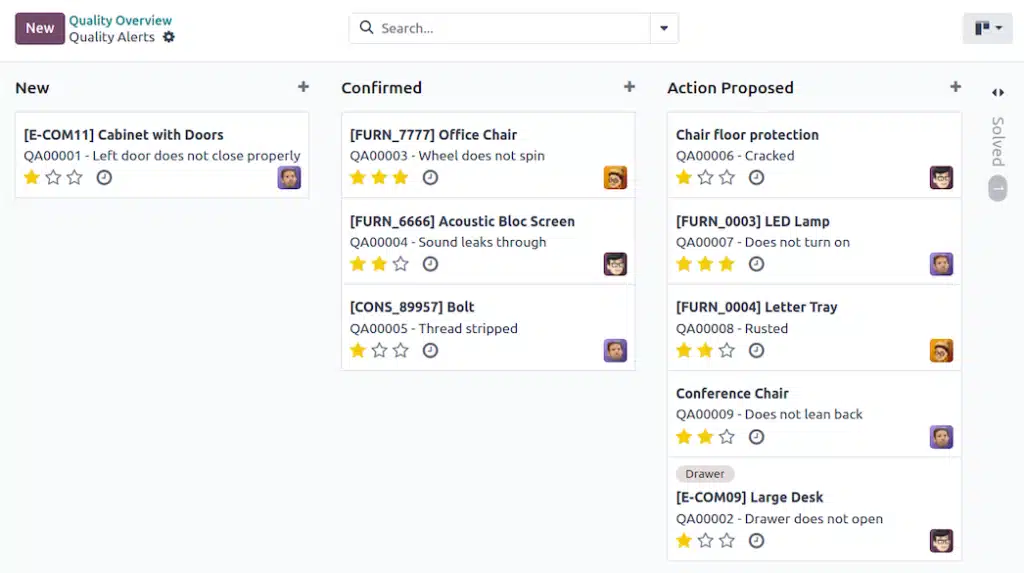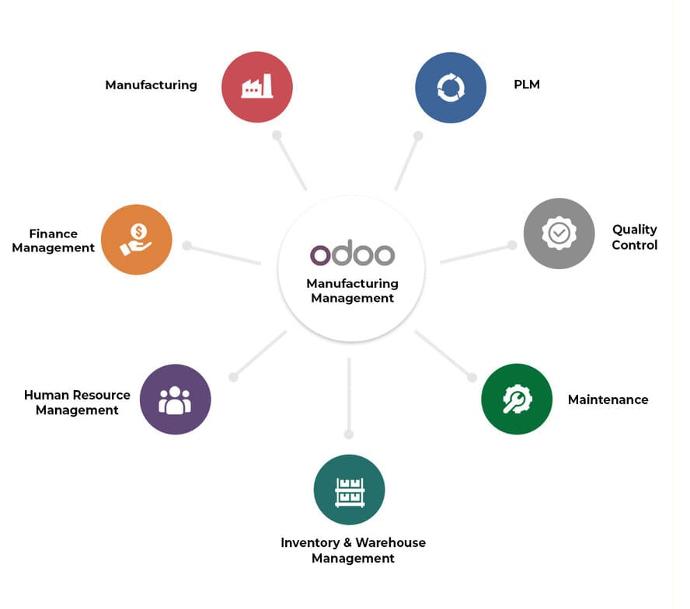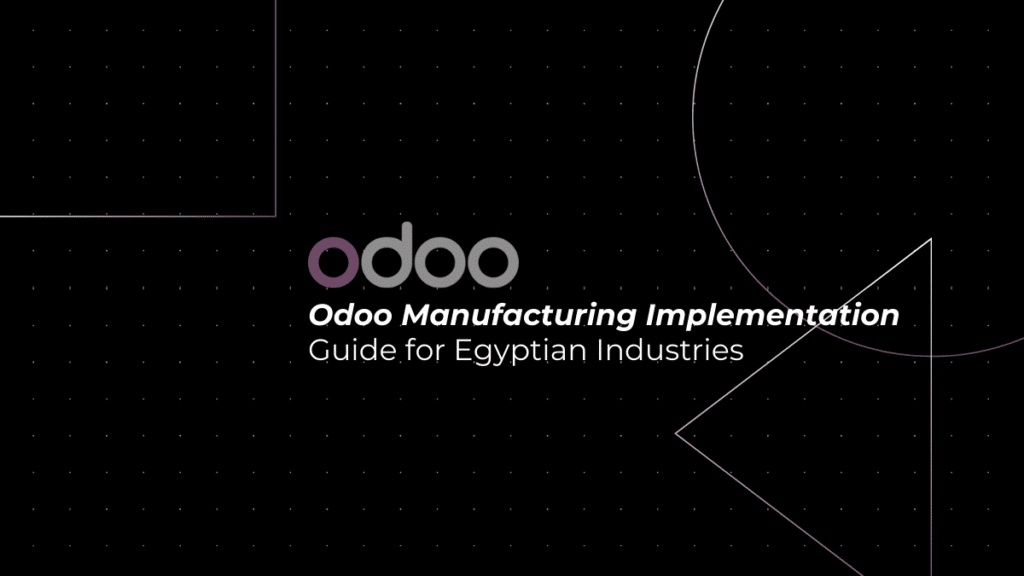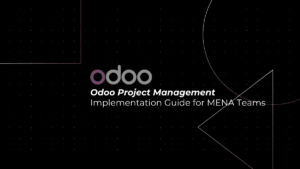Table of Contents
ToggleIntroduction
For manufacturing managers searching for an effective Odoo Manufacturing solution, this guide delivers actionable insights and practical steps to overcome industry-specific challenges. Did you know that Odoo Manufacturing has helped companies scale their operations from modest beginnings to multimillion-dollar enterprises while reducing planning time by over 60%? In the following sections, we detail how its integrated production management and Odoo MRP modules empower Egyptian industries with real-time control, shop-floor modernization, and cost efficiency—all underpinned by Industry 4.0 principles.
Strategic Production Optimization
In today’s fast-paced manufacturing environment, aligning production strategies with market dynamics is vital. Manufacturing ERP solutions like Odoo Manufacturing excel with features designed to optimize production planning and enhance resource allocation.
A. Master Production Scheduling (MPS)
What It Is: At its core, Odoo Manufacturing’s Master Production Scheduling capability offers a visual, drag-and-drop planning interface that synchronizes sales forecasts with production capacity.
How It Works: Managers can simulate “what-if” scenarios to evaluate the impact of changes across the entire production line—without disrupting live operations. For instance, if a sudden shift in demand occurs, production schedules automatically adjust, ensuring components arrive on time and labor resources are mobilized effectively.
Benefits:
- Reduced planning time through automation
- Increased resource utilization efficiency
- Enhanced production control that directly contributes to cost savings and higher throughput
Practical Example: Consider a mid-sized factory that integrated Odoo with its legacy systems. The implementation helped reduce planning meetings from several hours to mere minutes, leading to immediate improvements in operational responsiveness.
B. Bridging Sales and Production
Explanation: Odoo’s tightly integrated modules ensure that data flows seamlessly from sales orders to the production floor.
Actionable Tip: Leverage Odoo MRP’s real-time data feeds to compare production targets with actual machine performances and inventory statuses.
Expert Tip: Set automated alerts for production delays to allow immediate corrective actions, preventing bottlenecks that can hinder profitability.
C. Real-Time Adjustments & “What-If” Scenarios
Practical Advice: Use built-in simulation tools to prepare for peak demand periods.
Real-World Application: Manufacturers have reported a sharp drop in waste, thanks to intelligent “what-if” analysis that adjusts procurement based on revised production timelines.
Shop-Floor Modernization with IoT Integration
Traditional shop floors are quickly evolving, and sustainable success hinges on the ability to integrate digital technologies into daily operations. Odoo Manufacturing’s shop-floor solutions equip managers with cutting-edge tools to streamline processes and improve efficiency.
A. Internet of Things (IoT) Integration
What It Offers: The integration of IoT devices—such as barcode readers, RFID scanners, and machine sensors—enables real-time tracking of Work-In-Progress (WIP) items and components throughout the facility.
Benefits:
- Enhanced inventory accuracy
- Reduced manual data entry errors
- Timely maintenance and machine monitoring
Real-World Example: Manufacturers reported a 62% reduction in paperwork and significant improvements in production quality by integrating IoT Box devices with their production lines.
Actionable Advice: Equip your facility with digital work instructions on shop-floor tablets to immediately update teams about changes in SOPs (Standard Operating Procedures).
B. Digital Work Instructions & Automated Alerts
Detail: Odoo provides dynamic digital work instructions that instantly update operators on revised processes or emergency alerts.
Best Practice: Regularly review these digital work instructions to ensure that all changes in production or quality parameters are communicated without delay.
Example: In one case study, a manufacturing line integrated digital work instructions that reduced rework incidents by nearly 40%, proving the power of real-time communications.
Inventory Precision Engineering
Inventory management plays a critical role in manufacturing efficiency. Odoo Manufacturing addresses inventory challenges with a dual-layer management system, ensuring that every component is tracked—from raw material receipt to final product shipment.
A. Real-Time Component Tracking
How It Works: The system offers a robust solution to track every component down to the batch level.
Impact: Companies have achieved up to 98% accuracy in material availability checks—a vital stat for avoiding production lags.
Best Practice: Configure automated reorder rules and material reservations across multiple warehouses to ensure minimal stock-outs.
B. Optimized Reuse and By-Product Management
Explanation: Beyond simple tracking, the module supports by-product handling, meaning manufacturers can monetize residual outputs efficiently.
Practical Benefit: In documented cases, this functionality has facilitated a 15-20% cost recovery, directly impacting the bottom line.
| Feature | Impact |
|---|---|
| Real-Time Tracking | 98% material availability accuracy |
| By-Product Utilization | 15-20% recovery in hidden value |
| Serial/Lot Traceability | Full recall executed in < 2 hours |
C. Multi-Warehouse Coordination
Strategic Tip: For enterprises dealing with multiple production sites or warehouses, Odoo’s ERP integrates inventory data to provide a holistic view—ensuring seamless coordination and minimized discrepancies.
Actionable Idea: Leverage this feature to automate inter-warehouse transfers, reducing human errors and administrative overhead.
Quality Assurance & Operational Integrity

Quality is an indispensable factor in manufacturing that directly influences brand reputation and customer satisfaction. Odoo Manufacturing embeds quality control mechanisms across the entire production cycle—ensuring compliance, rapid response to anomalies, and continuous improvement.
A. Integrated Quality Checks
Incoming Materials:
- Automatic holds on shipments that do not meet Certificate of Analysis (COA) standards.
- Prevents flawed components from entering the production process.
In-Process Quality:
- Mandates tool calibration and verification before critical manufacturing operations commence.
- Real-time monitoring detects deviations quickly, minimizing scrap or rework.
Finished Goods:
Implements first-article inspections through digital sign-offs, ensuring consistency and quality before products exit the plant.
B. Automated Non-Conformance Reporting
Benefits: The automated trigger system for non-conformance reports helps manufacturers quickly identify and respond to quality issues—reducing defect recurrence by an estimated 40%.
Actionable Tip: Regularly analyze root-cause data provided by the ERP to make informed decisions on process improvements.
C. Documentation & Compliance
Key Consideration: Keeping real-time records and digital logs ensures that compliance audits are less tedious and more transparent.
Best Practice: Use Odoo Manufacturing’s reporting tools to generate monthly quality performance reports for internal reviews and external audits.
Financial Governance & Cost Transparency
Robust financial oversight is a hallmark of any successful manufacturing operation. With modern ERP solutions, Odoo Manufacturing offers features to meticulously monitor and control production expenses and profitability.
A. Detailed Cost Rollup & Expense Tracking
Feature Highlight: The Cost Rollup function details every aspect of production costs—from energy consumption and labor expenses to tool wear.
Real-World Example: A case study highlighted that producers using Odoo Manufacturing achieved a Return on Investment (ROI) exceeding 200% within operational cycles by optimizing cost structures.
Actionable Advice: Implement activity-based costing to fully understand cost distribution, leading to better-informed pricing and production decisions.
B. Accurate COGS and Overhead Allocation
How It Works: By comparing estimated versus actual material usage (down to 0.01kg precision), managers gain a granular understanding of Cost of Goods Sold (COGS).
Fresh Perspective: This transparency facilitates not only reliable financial reporting but also the identification of process improvements that further reduce overheads.
Tip: Use the financial dashboards provided by Odoo Manufacturing to track performance in real time and adjust strategies accordingly.
Implementation Best Practices: Do’s, Don’ts, and Real-World Lessons

Implementing an ERP system like Odoo isn’t an overnight endeavor. Here are actionable steps, best practices, and common pitfalls to avoid during the transition:
A. Do’s
- Set Clear Objectives – Define the key production management goals you wish to achieve.
- Engage Stakeholders – Involve both shop-floor operators and managerial teams to ensure the system meets all operational needs.
- Pilot Testing – Start with a pilot test on a single production line to iron out any issues before full-scale implementation.
- Continuous Training – Regularly train employees to stay updated on new functionalities and process changes.
- Use Real-Time Data – Focus on leveraging real-time insights from the ERP for continuous improvement.
B. Don’ts
- Don’t Rush the Process – Avoid rapid implementation without sufficient testing; it may lead to operational disruptions.
- Don’t Overlook Data Security – Ensure all integrations comply with cybersecurity best practices to protect sensitive production data.
- Don’t Underestimate Change Management – Recognize that shifting to a digital system requires cultural and procedural adjustments.
- Avoid Over-Complex Configurations – In the early stages, keep configurations simple and scalable to prevent system overloads.
C. Real-World Implementation Lessons
Case Study Recap: A mid-sized company reported that after leveraging Odoo MRP’s real-time adjustments, they improved production scheduling efficiency by 40%, enabling seamless communication between planning and shop-floor execution.
Expert Insight: “Odoo allowed our company to efficiently manage a growth from $2.4M to $15M in just four years,” stated Jacky Lecuivre, CEO at Coppercnic—a testament to the platform’s scalability and robust functionality.
Advanced Tips and Best Practices for Manufacturing Managers

Leverage these expert-level strategies to maximize the benefits of your ERP solution and drive transformation within your organization:
A. Data-Driven Decision Making
Strategic Recommendation: Use built-in dashboards and analytics to track production KPIs—such as cycle times, machine utilization rates, and labor costs.
Practical Tip: Integrate predictive analytics for forecasting potential production bottlenecks before they occur.
B. Integrate with Complementary Technologies
Actionable Advice: Expand Odoo Manufacturing’s capabilities by integrating complementary systems, such as Customer Relationship Management (CRM) or Supply Chain Management tools.
Example: Integrating CRM with production management facilitates a seamless flow of customer feedback into production planning, ensuring that products evolve in line with customer expectations.
C. Monitor Industry Trends
Key Consideration: Stay ahead by keeping an eye on emerging trends such as smart automation, IoT, and AI-driven optimization.
Best Practice: Regularly update your system to adopt new functionalities that further streamline processes and maintain your competitive edge.
D. Continuous Improvement
Long-Term Vision: View your ERP implementation as an evolving process.
Implementation Tip: Schedule quarterly reviews to assess system performance and identify areas for improvement—be it new modules, workflow adjustments, or additional staff training.
Comparison: Odoo Manufacturing vs. Traditional ERP Solutions
When deciding on a manufacturing ERP, understanding the differences between innovative solutions like Odoo Manufacturing versus conventional systems is key. Below is a summary comparison:
| Criteria | Odoo Manufacturing | Traditional ERP |
|---|---|---|
| Implementation Time | Rapid deployment thanks to modular design | Often longer, complex integration processes |
| Cost Efficiency | Lower cost (~60% below industry benchmarks) | Generally higher implementation and ownership costs |
| Real-Time Operations | Full real-time visibility and IoT integration | Limited real-time tracking, often isolated systems |
| Customization & Flexibility | Highly customizable with scalable modules | Rigid structures with limited configuration |
| User Experience | Intuitive interface with modern digital tools | Often dated interfaces with steep learning curves |
Future-Proofing Your Production Management Strategy
In an era where change is the only constant, manufacturing managers must ensure that their systems are agile enough to adapt and evolve. With rapid technological advancements and increasing customer expectations, ERP solutions like Odoo Manufacturing provide a roadmap to future-proof your operations.
A. Embracing Digital Transformation
Forward-Thinking Tip: Prioritize systems that integrate with future technologies such as augmented reality for maintenance, AI-driven analytics, and advanced IoT solutions.
Real-World Application: Manufacturers transitioning from legacy systems have noted significant improvements in operational efficiency and innovation capacity when upgrading to modern ERP modules.
B. Scalability as an Imperative
Key Consideration: Today’s small-scale production systems can scale into multinational operations using the same platform.
Expert Insight: With Odoo MRP, you can start small—managing a single production line—and seamlessly scale to implement enterprise-wide controls as growth demands.
C. Industry 4.0 Integration
Detail: Leveraging connected devices, real-time analytics, and automation positions manufacturers at the forefront of Industry 4.0.
Practical Tip: Stay updated with the latest upgrades that incorporate Industry 4.0 principles, ensuring your production management remains future-ready and competitive.
Conclusion
Odoo Manufacturing stands out as a robust, scalable, and cost-effective manufacturing ERP solution that not only meets current demands in production management but also anticipates future needs. By integrating real-time planning, IoT-driven shop-floor modernization, precision inventory tracking, stringent quality controls, and detailed financial governance—all within a single cohesive system—Odoo provides manufacturing managers the tools to transform operations, reduce costs, and drive sustainable growth.
Whether you are a job shop or a multinational OEM, this comprehensive guide has outlined actionable strategies tailored for Egyptian industries. Test the waters with its free tier and witness how transitioning to a fully digital, connected ERP can elevate your production management practices and future-proof your operations.
Embrace the digital transformation today—because in a landscape where every minute counts, Odoo Manufacturing is not just an upgrade; it’s a strategic necessity.
Quick Recap of Key Points
Strategic Production Optimization: Leverage Master Production Scheduling for real-time planning and seamless alignment between sales and production.
Shop-Floor Modernization: Integrate IoT devices, digital work instructions, and real-time monitoring to modernize production processes.
Inventory Precision Engineering: Achieve up to 98% inventory accuracy with real-time tracking, and maximize cost recovery through efficient by-product management.
Quality Assurance: Ensure product quality with integrated checks at every stage—minimizing waste and maximizing compliance.
Financial Governance: Utilize detailed cost rollups and real-time dashboards to drive efficiency and identify cost-saving opportunities.
Future-Proofing: Stay agile, scale with ease, and integrate emerging technologies to remain competitive in a fast-paced market.
Final Thoughts
Navigating the intricacies of modern production management requires more than just a conventional inventory system—it demands an intelligent, integrated approach that aligns with your production goals. With the multifaceted capabilities of Odoo Manufacturing, your manufacturing processes, quality control, inventory coordination, and financial tracking merge into a seamless dashboard from which informed decisions arise.
Remember, the journey to a fully integrated manufacturing ERP system is iterative. With continuous improvements, staff training, and a strong focus on technology adaptation, the transformative potential of Odoo Manufacturing in enhancing production management cannot be overstated.
Manufacturing managers in Egypt and beyond now have the tools to not just meet today’s challenges but to drive forward-thinking strategies that yield measurable, long-term success. Test key functionalities risk-free and experience firsthand how a modern ERP solution can be the cornerstone to elevating your manufacturing operations.
It’s time to take the next step in transforming your manufacturing operations. Explore the capabilities of Odoo Manufacturing with PyramidBITS and experience the full spectrum of advanced production management—tailored specifically for industries that demand excellence.
Try out the free tier to see how real-time analytics, integrated IoT tools, and comprehensive quality controls can redefine your operational blueprint.
Here’s to smarter manufacturing, efficient production processes, and a bright, digitally empowered future! Remember, every minute counts and every process improvement drives profitability—make your move with Odoo Manufacturing today.




